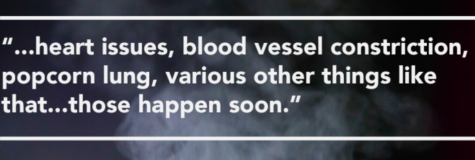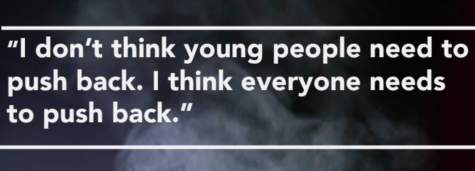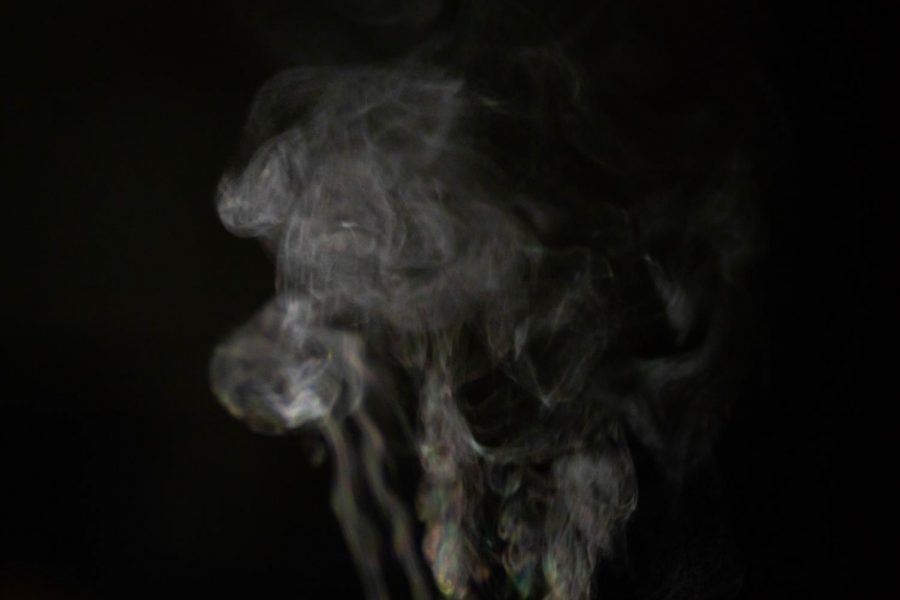A Cloud Over Tomorrow
Vaping has put a new face on addiction, and it’s not going anywhere
Photo: Laura Beard and Snowden Farnsworth
Vaping was originated as a means of quitting smoking, but now millions of teens are experimenting with nicotine products.
Where there’s smoke, there’s fire. And these days, where there’s a cloud, there’s a vape pen.
In its earliest stages over a decade ago, vaping was marketed as a means to ease the process of quitting smoking cigarettes but now threatens to make a new generation addicted to nicotine.
Vape pens and JUUL pods are the new metaphorical poster children of teenage addiction, and the controversial, nicotine-packed products found in the pockets of millions of teenagers can take a serious toll on the health of young people. These products use various flavors infused with water vapor to give users a high.
Many students were understandably wary of speaking to the Lodge, as vaping remains illegal for minors and against school rules, but one student was willing to discuss their past use of vaping products on the condition that we protect their identity.
“I used nicotine products to help myself deal with stress mainly,” the anonymous source told the Lodge. “I never used it much, but I definitely used it.”
This source has since quit vaping, but for a time, struggled with a minor addiction.
“I was introduced to these products by a friend of mine that goes to another school,” the source said. “We’d been good friends for a while, and he could tell that I was super stressed out and he was like, ‘here, this might take some of the stress away.’ And then it kind of worked a little, but then I started researching how bad it was for me and I was like, ‘hey, that’s not a good idea.’ But since it worked for the stress, I kind of kept doing it. Fortunately, I was able to stop pretty easily.”
The cost of this person’s addiction may not have extended too far into their academic and social lives, but the issue of losing their family’s trust has left a mark on them.
“There was a greater cost in my family life because they kind of know about it, and they don’t really trust me anymore,” the source said. “They did trust me, and now they don’t really. But they also know that I’ve stopped completely, and they’re monitoring me to make sure that I’ve stopped.”
Some addictions are short-lived, as in the case of this source. Others, however, can last longer and be more detrimental to the physical and mental health of users. Teenagers may not grasp how easily a young person can fall prey to addiction or that establishing a pattern of reliance on some substances can introduce risk of succumbing to the pressure of trying others.
Senior Aiden Tanzer has seen how such substances can harm young people, both among his friends and, on a smaller scale, in himself.
“I have become reliant on sleep aids and stuff, caffeine in the morning, but I’m able to function without that,” Tanzer said. “I’ve had imbalances of stuff in my body, and I took some stuff to get [balance]. I really felt weird if I didn’t take it but nothing too serious.”
Tanzer’s continued experience has seldom extended beyond mainstream remedies for insomnia or lack of energy, but his proximity to peers who have experimented with nicotine has given him insight into what that means for young people.
“I don’t anymore, but I used to hang out with a bunch of people who would do that stuff,” Tanzer said. “Of course I tried some, just because my friends were doing it… I didn’t want to be left out. Vaping, some other stuff. I didn’t like the way it made me feel. And so I was like, ‘this isn’t my thing. I’ll hang out with you guys but just not with that.’”

The sale and distribution of vaping products by persons under the age of 18 is illegal in Tennessee.
The issue of young people experimenting with vaping is widespread, and the local community is no exception. In Dec. 2018, Upper School Director Ms. Pam McCarthy directly addressed the issue of vaping one morning after chapel.
Ms. McCarthy asked that high school students remain in the gym for a few minutes, and she spoke to them candidly about the pattern of vaping that had swept over the high school. Ms. McCarthy focused on the reality that students need to be helped when they struggle with substances rather than lecturing them.
Upper School Dean Mrs. Kalyn Underwood has managed the disciplinary side of vaping at St. George’s, but beyond simply handing out consequences to students who break the honor code, Mrs. Underwood hopes to advise students about the dangers of addiction and equip them with the knowledge to make safe health choices.
“When I first started teaching here a few years ago, I knew a few students smoked, but I would never just see a cigarette lying on the floor,” Mrs. Underwood said. “It’s just that this is so much more accessible and concealable, which is why [vaping] is becoming so much of an epidemic.”
The progression from smoking nicotine in cigarette form to vaping it in a small pen or pod has made it easier to hide, and it has opened the door for exponentially more young people to use these devices without immediate disciplinary repercussions.
“If you were wanting to smoke a cigarette, you could maybe before school, and then you’d have to wait again until after school, or maybe after practice, so you’d go hours [without smoking],” Mrs. Underwood said. “This is something that you can access potentially during the day much more easily, which then makes it so much easier to become addicted, because you can do it more often.”
As is the case with any addiction, whether on a small or large scale, recognizing the problem is the first step to solving it. Mrs. Underwood sees that the widespread use of vaping paraphernalia is a problem for the community’s youth, and she expressed how the school hopes to continue working with the community to solve the problem.
“Typically with something like vaping, if someone is found to be using it, especially if it’s found on campus, that is breaking a law,” Mrs. Underwood said. “Students often wind up going home. We talk with families. We move through the disciplinary process which may involve an honor council visit because it is a major school rule.”
While being subjected to punishment is never a desirable outcome for high schoolers, Mrs. Underwood insists that addressing this type of issue is in the best interest of students and their families.
“I feel very strongly about partnership with parents because the goal is to turn out happy, healthy, prepared kids,” she said. “And if you’re here 40 hours a week, then parents and us need to be working together to ensure that same goal.”
Achieving that goal means overcoming dependency. According to the American Psychological Association (APA), addiction is “a brain disease that is manifested as compulsive substance use despite harmful consequence.”
“Nicotine addiction worries me tremendously, because it is also shown to have problems with heart issues, blood vessel constriction, popcorn lung, various other things like that, and those happen soon,” Mrs. Underwood said. “We don’t know what all is going to happen with it, because to have nicotine sans tobacco is new.”

The physical problems associated with vaping are just one side of the coin. Mood changes, some subtle and some drastic, can define the user during and after the beginning of a vaping addiction.
Per Harvard University’s health website, the emotional effects of nicotine can start with the very thing that initially draws users in – a sense of relief, or relaxation. This is due to the rush of dopamine that comes with the use of nicotine, and yet, ironically, afterward the body begins to produce less dopamine on its own. The release one feels after vaping will often mean the need for more release later, as the body depends more and more upon nicotine to feel normal.
According to the Surgeon General’s website detailing the dangers of vaping, young people who have begun to use nicotine may be more susceptible to future addictions to other substances such as alcohol and harder drugs, as the developing adolescent brain becomes hardwired for dependency. Other risks include inhibited decision-making and lack of mood control.
Despite the obvious dangers, teenagers of America have been drawn into vaping in recent years. This is in large part due to companies like JUUL marketing their products as being “safe alternatives” to more serious practices such as smoking. In reality, vaping using a JUUL device is addictive in and of itself. Being perceived as less dangerous has made vape pens all the more dangerous.
Widespread use of nicotine and other addictive substances can seemingly normalize the idea of addiction. In a world where vaping is seemingly universal and accepted by an uncomfortably high proportion of young people, others can feel unnecessary pressure to cave to the temptation.
“I know one person that says it looks cool,” freshman John Miraglia said, in reference to the idea of why so many young people take up vaping. “And most everybody else, if I get into a deeper conversation with them, they say that…‘well, my friends did it, so I did it.’”
Peer pressure can apply to students of all ages – Miraglia has seen the trend of peers succumbing to social pressures as a freshman but was able to distance himself from the temptation.
“None of my friends have ever pressured me into it because I’m not that close with the people that [vape],” Miraglia said. “And even that being true, the people that did it, most of them are gone now.”
Miraglia faced the pressure of experimenting with vaping products but never succumbed to that pressure.
“Just brief thoughts, being around other people, but never really gone farther than that,” Miraglia said. Like Miraglia, the anonymous source faced similar pressure, but did allow the social dynamics to influence their decision to use vaping products.
“I wasn’t really forced into it,” the source said. “It was just [a friend and] me one-on-one. I didn’t do it because it was cool, but I know [that’s why] a lot of people do it. But since it was just me and that person one-on-one, it was kind of just like, ‘hey, this could help, and you know what, I’ll try it.’”
Mrs. Underwood understands that some students might not have a strong enough will to resist the temptation and could give in to peer pressure.
“Maybe they think they know better, or they’re not afraid about getting caught or that’s just what they’re going to do,” Mrs. Underwood said. “And you have kids in the middle who could waffle either direction and I’m hoping that we get a lot of those kids in the middle. I want the other kids to listen too and realize that the school cares.”
It’s not just other young people who can present teenagers with temptations and means of pursuing the high of substance use – big companies, like JUUL, actively profit off of teens’ insecurities. JUUL is currently making money off of the addictions of an estimated 2.1 million middle and high schoolers, according to a 2017 study by the Food and Drug Administration (FDA). The company grew to a market value of $10 billion four times faster than Facebook, making it by far the fastest growing company of all time.
JUUL’s official website gives a warning to customers upon logging on.
“JUUL Labs’ mission is to eliminate cigarettes,” the website reads. “JUUL products are cigarettes. You must be at least 21 years old to purchase products on JUUL.com.”
JUUL’s target audience may be adults seeking to quit smoking, but by selling products in various flavors, including Mint, Mango, Cucumber, Fruit and Creme, the company appeals to young people as well.
In an effort to support the fight against youth use of vaping paraphernalia, the federal government took action against stores that sell JUUL products. According to the official website of the FDA, “the agency issued more than 1,300 warning letters and civil money penalty complaints (fines) to retailers who illegally sold JUUL and other e-cigarette products to minors during a nationwide, undercover blitz of brick-and-mortar and online stores this summer.”
JUUL’s website claims they support efforts to eliminate the use of their products among youth with a statement on their website: “We support effective legislation and regulation to prevent the purchase and use of our products by minors.”
The sincerity of JUUL’s crusade against underage nicotine use has been called into question by public officials as the FDA has brought forth legislation to attempt to lower the rate of usage among youth. A number of states are in the process of either considering or implementing regulations to prohibit underage use of nicotine products – Tennessee, notably, prohibits the sale and distribution of vaping products to those under the age of 18, according to the Public Health Law Center at Mitchell Hamline School of Law.
As government officials at the state and federal level attempt to place legal restrictions on the use of vaping products, Mrs. Underwood shared words of advice for people struggling to stop vaping.
“For coming off of it, I really don’t know what you do besides…give your kid a nicotine patch to help them come down,” Mrs. Underwood said.
She further explained how she hopes her children will have an excuse to avoid vaping. “And then as a parent…I want you to have an excuse,” Mrs. Underwood said. “I want you to be able to say, ‘sorry, man, my mom’s nuts and she makes me pee in a cup every Friday, so no thanks.’’’
Based on his experiences with peers who have struggled, Tanzer lent advice to young people struggling with substances.
“I could tell them not to do it all I want, but ultimately it’s their choice,” Tanzer said. “I’m not gonna make their choices for them. It’s all up to them and what they want to do with their lives. Make good choices.”
Beyond simply making good choices, the anonymous source knows that a fight for independence from substances must come to the forefront of our societal agenda.

“I don’t think young people need to push back,” the source said. “I think everyone needs to push back, not just young people. It’s completely illegal for someone under 18 to buy any vape products, cigarettes, anything with nicotine in it.”
The source hoped young people would be free from addiction to nicotine in the future, but they understand that adults must play a role in that as well.
“It has to be coming from people older than 18, and those people must be held accountable for supplying underage people with drugs,” the source said. “Basically, I think that it should be more monitored by everyone, and [vaping should be] more frowned upon as a society than it already is.”
The source gave advice to those considering trying nicotine products.
“The lesson I learned is that it’s just not worth it,” the source said. “Risking getting addicted to the most addictive substance, risking all the health issues just to feel a little better for ten, fifteen seconds, it’s not worth it.”













